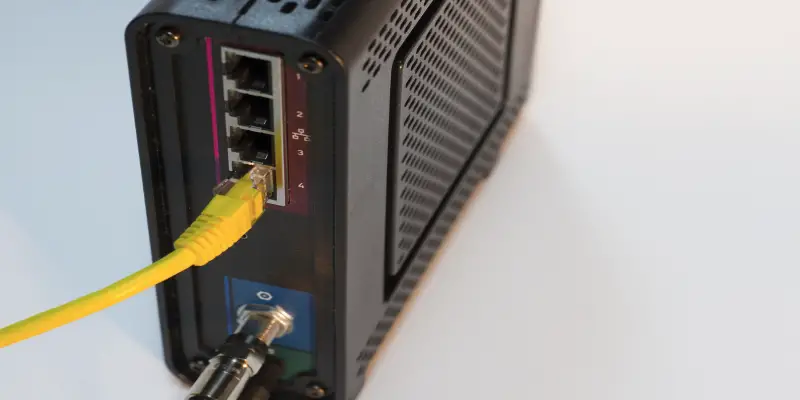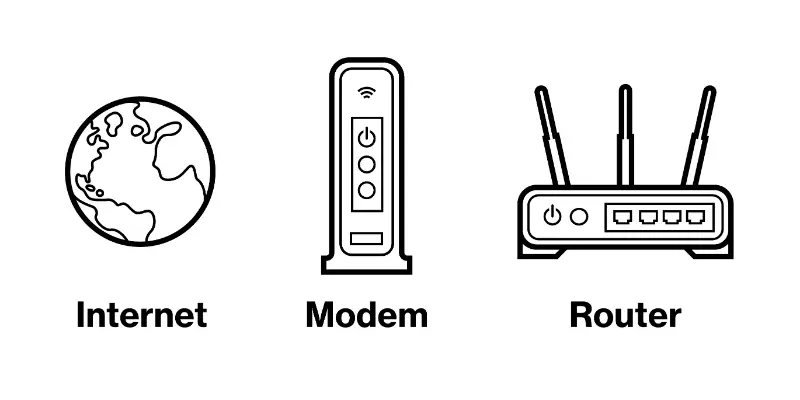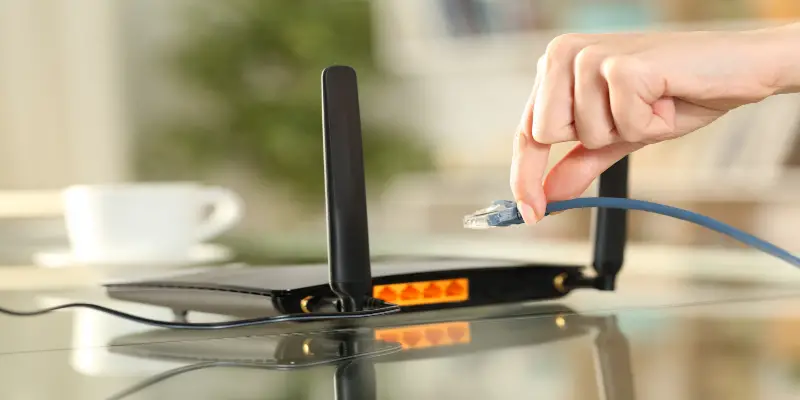Disclaimer: This post may contain affiliate links, meaning we get a small commission if you make a purchase through our links, at no cost to you. For more information, please visit our Disclaimer Page.
Setting up a new internet connection at home or office gets complicated for people who do not have any prior experience. A stable and speedy internet connection requires buying proper equipment and its proper installation. The most common question I usually hear from novices is whether they need a modem if they have an Ethernet port or not.
You don’t require a modem for a speedy connection if you have an Ethernet port. The modem installed by the internet provider company is sufficient for the functioning of the entire network. You can connect to the distributed ports through a reliable internet connection.
This argument should not let you think that modems are no longer helpful for internet users. You might also think of using a separate router without a modem.
This post aims to discuss different features of modem and routers besides addressing their utility in the provision of flawless internet connection at our homes and offices.
Table of Contents
What is the Use of a Modem?
The internet has become a necessity these days that has transformed how things were done in the past. This era of quarantine, with people working, shopping, studying, and trading from home, has further increased the need for a stable internet connection.
However, not many people know about the significance of a modem for stable connectivity.
A modem is a device that enables the internet connection of devices at your home. Without a proper modem, sending and receiving the data signal from our computer devices to the outside world is nearly impossible.
Using a modem makes it possible for users to translate the electrical signal to digital ones because all modern devices understand digital signals.
Knowing the modem and its defining attributes will further enhance your understanding of the significance and use of modems.
What is a Modem?
The term modem describes a term called “modulator-demodulator.” In simple terms, a modem is a device that acts as a bridge between the internet service providers and the home that uses the internet connection.
It receives signals from the internet company and transforms them into a form that is easily understandable by your devices.
Similarly, it sends the signals back to the internet provider in a form that is understandable by the servers of the internet service providers.
In this way, sending and receiving the data over the internet is possible without involving any hassle. In short, it is a device that facilitates the connection of devices at home with the outside world.
People used telephone lines for sending and receiving network signals in the past. As a result, they required a mechanism that can transfer the form of signals transmitted or received so that they become easily readable by the receiving device.
Even now, a modem is a crucial aspect of any internet connection.
How Many Ports are There on a Modem?
The number of Ethernet ports on any modem varies in different parts of the world. However, usually, you will find three ports on a modem that serve different purposes.
One port is there for the internet connection. The other two are for the power source and router. Modern modems utilize fiber-optic connections instead of telephone lines for speedy transmission.
Do Internet Service Providers Provide Modem?
An internet provider company provides initial equipment, including a modem, when you first buy an internet plan from a service provider.
That is why I always suggest there is no need for an additional modem if the quality of the connection is dependable with minimal lag.
How does a Modem Work?
You can classify the working of a modem device into two things. At first, it takes command from our devices as a digital signal and processes it into an analog signal that can be transferred via telephone or cable lines.
Converting digital signals into analog signals understandable by the system’s servers is called modulation.
On the other hand, the modem receives signals from the servers of internet providers as analog signals.
At this stage, it converts these analog signals into a digital format so that your computer can understand the data sent by those servers. Converting analog signals to digital form is demodulation.
As the modem is involved in the modulation and demodulation of data signals, it gets its name mo-dem.
Is Modem a Compulsion For Internet Connectivity?
The advancement of technology has revolutionized the way things used to function in the past. Instead of using a standalone modem, many computer manufacturers now offer computer devices with a built-in mechanism of a modem.
In this way, the need for a modem for internet connectivity is eliminated.
Some internet service providers directly offer Ethernet ports to users for seamless connectivity. You can quickly plug in these ports to the desired computer device for the internet connection.
In this situation as well, you do not require a separate modem device for hassle-free connectivity.
Direct access to the internet via Ethernet ports is possible due to the availability of an Ethernet wire in those ports. The internal wiring replicates the Ethernet connection while maintaining a clean outlook.
Nonetheless, there is a negative side to this internal Ethernet wiring in the ports. Whenever a wire gets damaged, it becomes difficult for users to highlight and replace the damaged wire.
But what if you are looking for a wireless Wi-Fi connection of multiple devices within the same internet connection? This is where Routers enter the market.
Some modems do have built-in Wi-Fi features, while others do not have Wi-Fi capability. Therefore, it is worth understanding the principle that governs the working of a Router.
Does the Ethernet Cable Plug into a Modem or Router?
Both the modem and router have multiple Ethernet ports to allow users to connect various devices. In general, you will find more Ethernet ports on a router than a modem.
Can You Just Use a Router Without Modem?
You can conveniently use a router without using a modem. It can assign IP Addresses to connected devices besides transferring data among these devices.
On the contrary, you do not need a separate router if you are a single user of an internet connection at home. However, you will undoubtedly require a router if multiple devices in a house need web access from a single internet connection.
The router assigns IP addresses to every device on the network and helps in seamless connectivity. Another significant aspect of using a router is enhanced Wi-Fi coverage that is suitable for flawless connectivity if you live in a big house.
The answer to this question might seem incomprehensible if you do not know what the router is and how it facilitates the internet connectivity of multiple devices.
What is a Router?
If you are not the only user of the internet connection at your home, you probably need a router. A router is a device that can distribute the internet connection from your modem to any other device in the house.
In this way, you can use a single internet connection to run web-based services on your laptops, Smart TVs, mobile phone devices, and other wireless devices.
In contrast to a modem that connects your computers with a WAN (Wide Area Network), a router connects devices in a LAN (Local Area Network).
More specifically, it combines multiple devices within a short-range network, while a modem connects two or more devices within a long-range network.
Advantages of Using a Router
The primary significance of using a router is the WiFi connectivity of multiple devices within a single network.
It can cover devices within a building, office, apartment, and other devices within a short-range distance. It is further helpful for users in the following ways:
IP Address Management
The allocation of IP addresses on a network facilitates seamless connectivity of every device on the network. You may consider an IP address as a mailing address where data related to a particular device is sent and received by the servers.
For instance, if device A wants to open a website on the internet, the router will send related data to device A only, instead of sending it to other devices on the network. In this way, the router maintains the efficiency of the network by sending responses to the location that demands it.
Top-Notch Security Settings
Another aspect worth mentioning when using a router for LAN is the availability of multiple security settings in a router. For instance, you can quickly block an unwanted device on the network for restricted access.
You can also set the number of maximum connections within a network. Moreover, you can hide your network from non-users for interruption-free usage.
This hiding feature of the routers allows you to enhance the security of your network. Put simply, a LAN network that is hidden to non-users has rare chances of hacking and phishing.
Easy communication
One of the most significant benefits of using a router in a local network is the ease of communication between multiple devices within the same network.
For instance, it helps you manage many settings on your Smart Home devices with the help of the relevant company’s app.
Additionally, the availability of multiple Ethernet ports on the router further enhances the desirability of these devices.
In contrast to a modem with two Ethernet ports, the router offers multiple Ethernet ports that help you connect several Wired devices within a network.
Is There Any Smart Solution?
The use of a multipurpose device is the only solution in this regard.
Use of a Multipurpose Device
The most obvious hack is to buy a multipurpose device that serves the purpose of both a modem and router. In this way, a single device can get the job done for you.
You only have to buy a high-end modem that features a built-in router to facilitate the seamless functioning of the network. In this way, the process becomes inexpensive and more convenient for users.
Conclusion
An Ethernet port does not need a separate modem for an internet connection. A single modem is sufficient for enabling web connectivity to modern devices.
However, if you want I would recommend buying a multipurpose modem with a built-in router for maximum convenience and value.



